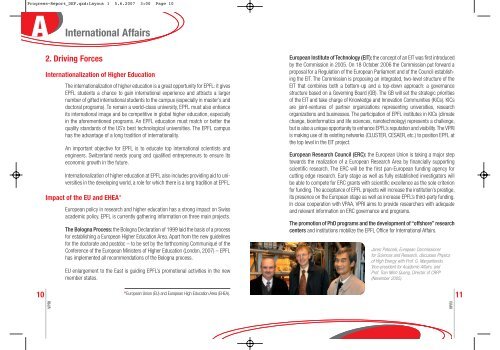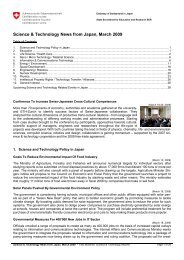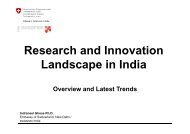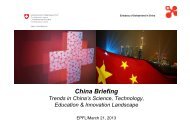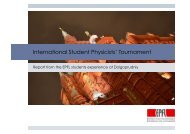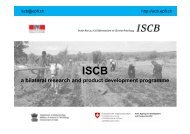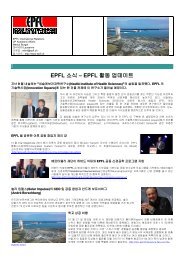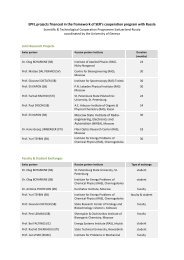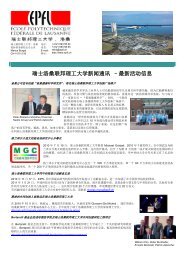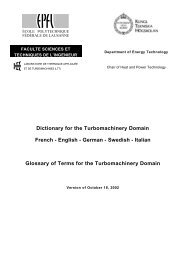International Affairs - Relations Internationales - EPFL
International Affairs - Relations Internationales - EPFL
International Affairs - Relations Internationales - EPFL
Create successful ePaper yourself
Turn your PDF publications into a flip-book with our unique Google optimized e-Paper software.
Progress-Report_DEF.qxd:Layout 1 5.6.2007 3:00 Page 10<br />
A<br />
10<br />
VPRI<br />
<strong>International</strong> <strong>Affairs</strong><br />
2. Driving Forces<br />
<strong>International</strong>ization of Higher Education<br />
The internationalization of higher education is a great opportunity for <strong>EPFL</strong>: it gives<br />
<strong>EPFL</strong> students a chance to gain international experience and attracts a larger<br />
number of gifted international students to the campus (especially in master’s and<br />
doctoral programs). To remain a world-class university, <strong>EPFL</strong> must also enhance<br />
its international image and be competitive in global higher education, especially<br />
in the aforementioned programs. An <strong>EPFL</strong> education must match or better the<br />
quality standards of the US’s best technological universities. The <strong>EPFL</strong> campus<br />
has the advantage of a long tradition of internationality.<br />
An important objective for <strong>EPFL</strong> is to educate top international scientists and<br />
engineers. Switzerland needs young and qualified entrepreneurs to ensure its<br />
economic growth in the future.<br />
<strong>International</strong>ization of higher education at <strong>EPFL</strong> also includes providing aid to universities<br />
in the developing world, a role for which there is a long tradition at <strong>EPFL</strong>.<br />
Impact of the EU and EHEA 6<br />
European policy in research and higher education has a strong impact on Swiss<br />
academic policy. <strong>EPFL</strong> is currently gathering information on three main projects.<br />
The Bologna Process: the Bologna Declaration of 1999 laid the basis of a process<br />
for establishing a European Higher Education Area. Apart from the new guidelines<br />
for the doctorate and postdoc – to be set by the forthcoming Communiqué of the<br />
Conference of the European Ministers of Higher Education (London, 2007) – <strong>EPFL</strong><br />
has implemented all recommendations of the Bologna process.<br />
EU enlargement to the East is guiding <strong>EPFL</strong>’s promotional activities in the new<br />
member states.<br />
6 European Union (EU) and European High Education Area (EHEA).<br />
European Institute of Technology (EIT): the concept of an EIT was first introduced<br />
by the Commission in 2005. On 18 October 2006 the Commission put forward a<br />
proposal for a Regulation of the European Parliament and of the Council establishing<br />
the EIT. The Commission is proposing an integrated, two-level structure of the<br />
EIT that combines both a bottom-up and a top-down approach: a governance<br />
structure based on a Governing Board (GB). The GB will set the strategic priorities<br />
of the EIT and take charge of Knowledge and Innovation Communities (KICs). KICs<br />
are joint-ventures of partner organizations representing universities, research<br />
organizations and businesses. The participation of <strong>EPFL</strong> institutes in KICs (climate<br />
change, bioinformatics and life sciences, nanotechnology) represents a challenge,<br />
but is also a unique opportunity to enhance <strong>EPFL</strong>’s reputation and visibility. The VPRI<br />
is making use of its existing networks (CLUSTER, CESAER, etc.) to position <strong>EPFL</strong> at<br />
the top level in the EIT project.<br />
European Research Council (ERC): the European Union is taking a major step<br />
towards the realization of a European Research Area by financially supporting<br />
scientific research. The ERC will be the first pan-European funding agency for<br />
cutting edge research. Early stage as well as fully established investigators will<br />
be able to compete for ERC grants with scientific excellence as the sole criterion<br />
for funding. The acceptance of <strong>EPFL</strong> projects will increase the institution’s prestige,<br />
its presence on the European stage as well as increase <strong>EPFL</strong>’s third-party funding.<br />
In close cooperation with VPAA, VPRI aims to provide researchers with adequate<br />
and relevant information on ERC governance and programs.<br />
The promotion of PhD programs and the development of “offshore” research<br />
centers and institutions mobilize the <strong>EPFL</strong> Office for <strong>International</strong> <strong>Affairs</strong>.<br />
Janez Potocnik, European Commissioner<br />
for Sciences and Research, discusses Physics<br />
of High Energy with Prof. G. Margaritondo,<br />
Vice-president for Academic <strong>Affairs</strong>, and<br />
Prof. Tran Minh Quang, Director of CRPP<br />
(November 2005).<br />
VPRI<br />
11


